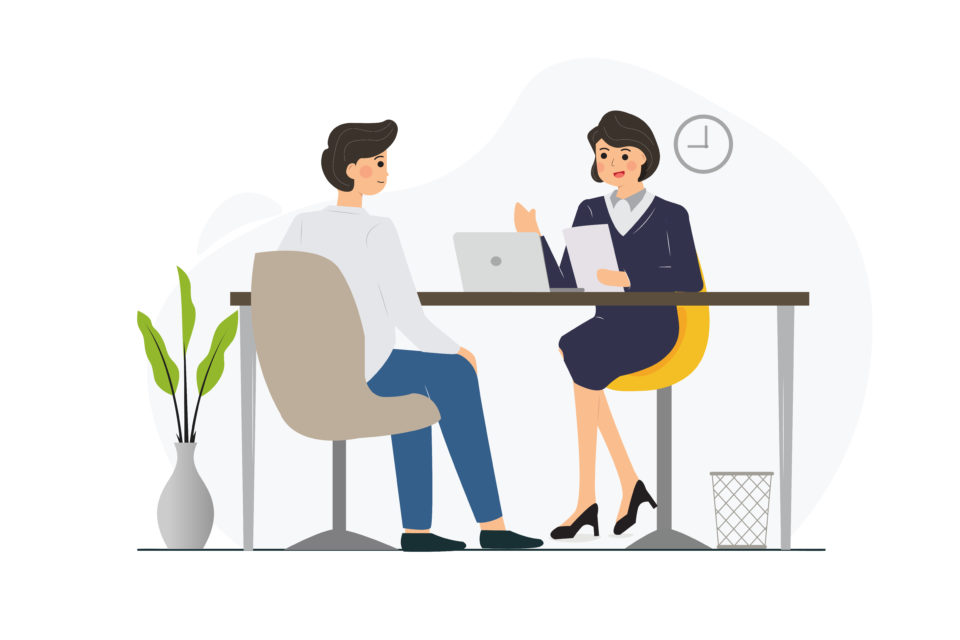Don’t wear strong perfume, don’t sweat it, dress appropriately, and make an excellent first impression.
Job interviews generally last from 30 to 60 minutes. And how long do you have to make an impression? Just 20 seconds. Yes, that’s right: 20. Your clothes and behaviour in those first 20 seconds play a massive role in whether you’ll get hired.
So what should you wear? Let’s start with what you shouldn’t: Don’t wear strong perfume or cologne. What smells good to you might not to your interviewer. And you never know – that scent you’re so fond of might just be a smell that triggers memories of the interviewer’s bad breakup!
Sweat can be a nightmare at interviews – it makes you look less confident, less competent, and even less trustworthy. So what can you do about it?
Start by using unscented antiperspirant. Wear a cotton undershirt and, if you’re a heavy sweater, consider using sweat pads under your armpits. Use a handkerchief or scarf to keep your hands dry, and, if possible, ask for some ice water before the interview to keep your hands cool. Remember, don’t drink alcohol the night before your interview, and coffee is off-limits on the day of the interview – both can trigger sweating.
And what should you wear? Well, research shows that nice clothing simply makes you appear more competent. But you don’t have to spend a fortune on your interview outfit – just find something that looks stylish. Think about sweat in this context, too – clothes that don’t show it are best. And it’s imperative to remember to iron those new clothes before the interview.
Now you’re dressed to impress and ready for that interview – but what was that about behaviour? Well, there are a few things you must do.
First, smile – a genuine smile. The more you smile, the more your interviewer will expect things to go well. Smiling will also calm you down, as it reduces stress hormones in your blood.
Second, be sure to make strong eye contact. This shows that you’re confident and increases the interviewer’s belief in you. But only do this at the beginning, as too much eye contact can make you appear dishonest.
Finally, give a firm handshake – this also shows your confidence. And use the interviewer’s name; this demonstrates respect and shows you consider the interviewer important.
You’re doing well so far – but how do you ace the rest of the interview?
Think of Interviewing like a game of tennis.
The most commonly asked opening interview request is Tell me about yourself. This isn’t an opportunity for you to talk through your CV, though. Your interviewer has read it. To counter this with a “magical first sentence.” Use the interviewer’s name, express interest, and pivot the conversation by talking about the company or the interviewer.
For example, you could say something like, “Sarah, I’m excited to be here because for the last ten years, I’ve been working on marketing strategies, and what you do here is far better than anything I’ve seen before. How did you start to . . . .” You get the idea.
You can imagine this kind of interview tactic as being like a game of tennis. Each time you’re asked a question, make sure you hit the ball back to the interviewer. This way, you make the interview into a two-way conversation: First, answer the interviewer’s question, but then finish with a question of your own.
Interviews usually result in one winner. You want that to be you. Help that happen by creating a “memorable moment” during your interview – a moment when the interviewer feels she’s taught you something, changed your mind or improved on an idea that you offered.
How exactly? Make the interviewer feel great about herself by leaving a two-second gap before you respond to a question or a point she’s made. This breaks the conversation and shows you’re thinking about what she said or asked. You’ll come across as a great listener, too!
There are two other common interview questions you should prepare for:
First, Why are you leaving your current job? There are no perfect answers to this, but whatever you do, don’t answer this with negatives about your current boss or company. All this will do is end up reflecting poorly on you.
Second, What are your salary expectations? Don’t just add x amount to your current rate; do some research before the interview to know the position’s market rate. You don’t have to give a number at all, but you could instead say that you want a fair rate.
At the end of most interviews, you’ll also be asked whether you have any questions. Of course, you do! This will give the interviewer more opportunities to talk about herself. You could ask, for example, “What excites you about working here?” “What challenges have you faced here?” Or “Do you have any hesitation about me fitting in?”
Finally, you should always follow up. Write a simple thank-you note to take this opportunity to stand out.

